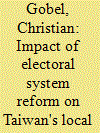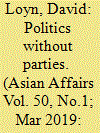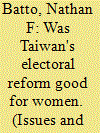| Srl | Item |
| 1 |
ID:
092513


|
|
|
| 2 |
ID:
100267


|
|
|
|
|
| Publication |
2010.
|
| Summary/Abstract |
We explore in this article an institutional foundation of agricultural protectionism in Japan, a country long recognized as resisting international pressures to open up its rice market. Using our qualitative analysis of postwar politics of agricultural protectionism and a simple formal model, we argue that farmers in Japan have stronger incentives to mobilize electoral support for the governing party in multimember district systems than in single-member district systems, because the marginal effects of mobilization on policy benefits are different under these electoral systems. Our empirical findings corroborate this claim and provide implications for the gradual changes in Japan's farm policies occurring after the electoral reform in 1994.
|
|
|
|
|
|
|
|
|
|
|
|
|
|
|
|
| 3 |
ID:
114785


|
|
|
|
|
| Publication |
2012.
|
| Summary/Abstract |
This article discusses specific impacts of the abolishment of the single non-transferable vote (SNTV) in Taiwan. The SNTV had long been seen as a major factor in the sustenance of county- and township-level clientelist networks. It was associated with extremism, candidate-centered politics, vote-buying, clientelism and organized crime involvement in politics. This article examines the impact of the electoral reform on the mobilization capacity of a local faction in a rural county notorious for its factionalism. The analysis indicates that the clientelist structures are too resilient to be affected by even a radical electoral reform.
|
|
|
|
|
|
|
|
|
|
|
|
|
|
|
|
| 4 |
ID:
165217


|
|
|
|
|
| Summary/Abstract |
Democracy has not brought stability to Afghanistan in the almost two decades since the fall of the Taliban. But it would be wrong to conclude that the soil of Afghanistan is not conducive to the tree of democracy, when in reality it was never planted with any skill. Democracy did not fail in Afghanistan; it was never even tried.
|
|
|
|
|
|
|
|
|
|
|
|
|
|
|
|
| 5 |
ID:
094419


|
|
|
|
|
| Publication |
2010.
|
| Summary/Abstract |
During the five democratic elections held in Taiwan from 1992 to 2004 inclusive, the formerly dominant Kuomintang Party (KMT) was temporarily supplanted by the Democratic Progressive Party (DPP) as the nation's largest political party. Most explanations for this have focused on party fragmentation and the changing patterns of electoral competition it helped create. These are important factors, but they have not been tested empirically at the level where candidates won and lost legislative seats, the level of the election district. This article offers such an empirical test, and it will show that these two factors had a direct impact on the ability of DPP and KMT candidates to obtain legislative seats. We also show that these factors carried indirect impacts by hurting the ability of the KMT and DPP to nominate in a way that they would obtain all the seats that their obtained vote shares would allow.
|
|
|
|
|
|
|
|
|
|
|
|
|
|
|
|
| 6 |
ID:
132777


|
|
|
|
|
| Publication |
2014.
|
| Summary/Abstract |
Relative to other countries in the world, Taiwan has consistently elected large numbers of women to political office. This paper argues that women have done well in Taiwan because of the reserved female seat system in SNTV elections and that the 2005 reform from SNTV to MMM did not produce further gains in gender equality. SNTV with reserved seats produces incentives for parties to cultivate large numbers of powerful women in order to ensure that other parties are not able to win cheap or free seats. Empirically, the evidence shows that women win significantly more votes and seats in districts with reserved seats than in those without them. Moreover, winning an SNTV election requires candidates to amass power resources, and the women who survive this arduous test have power that can be used for other political goals. Women elected on party lists do not necessarily accumulate as much power. The new MMM system has arguably not produced more female legislators than the old SNTV system would have, and it has reduced the aggregate power that women in the legislature can wield.
|
|
|
|
|
|
|
|
|
|
|
|
|
|
|
|